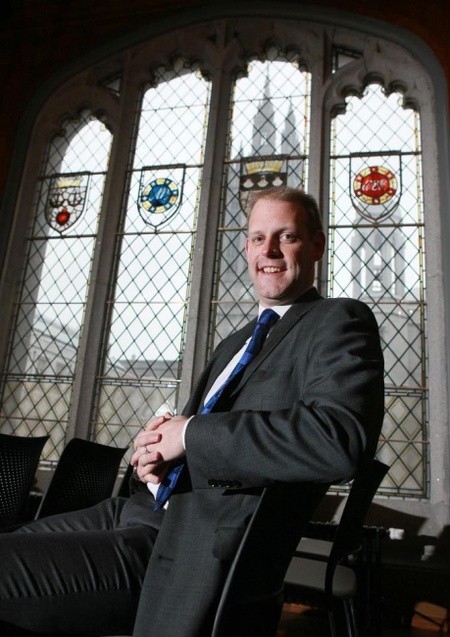Neil McLennan, a Senior Lecturer and Director of Leadership Programmes in the School of Education considers the future for education in Scotland in light of changes forced upon it by the Covid crisis. McLennan sits on a number of education reform groups as well as Scotland’s Futures Forum (the Scottish Parliament’s Think Tank) and is a contributor to the recent Scotland 2030: Future Schooling, Learning and Education report
The return of early primary and specialist secondary school classes alongside notification of the further return of other classes (15 March ) has re-activated education reform discussions. Teaching unions are asking if schools are safe, whilst one Aberdeen headteacher said they would vaccinate their own staff. But in the midst of these short term difficulties, the Covid crisis also provides an opportunity – and indeed a driver – for the longer-term reform of education in Scotland.
World crises are often levers for change. As Trotsky said; “war is the locomotive of history.” and at the heart of social change is education. But as the Covid pandemic has demonstrated, our education system needs its own shot in the arm. In recent years, that hasn’t been achieved and education has instead become a political football. Covid has shone a light on the need for system wide reform which could improve life chances for students. And while all changes do not necessarily lead to improvement, to improve things we certainly need changes.
Some are shouting to abolish exams. Assessment needs better balance however abolishing exams will not work. Whatever the model, assessment is a selection system. Even if every student gained “5As” in exams, another discriminator would occur in society. Social justice is much trumpeted but the full realisation of it takes much more than minor policy tinkering. The SQA exam crisis of 2020 showed how little social justice was considered when faced with tough decisions. The attempt to grade students by historic algorithm reeked of hypocrisy from politicians telling teachers to ‘close the attainment gap’. Our concepts of social justice now need revolutionised as opposed to the current window dressing rhetoric.
Governance wise, the crisis has shown the limitations of some national education bodies. Researcher Barry Black, called for the Scottish Qualifications Authority to be scrapped. Education improvement agency, Education Scotland, have also been questioned by MSPs. There have been many calls to disaggregate its inspectorate and support departments. Recently the majority of their staff felt that they did not agree change was managed well internally. Now may be an opportune time to end monopolies of power in education, moving towards nimbler, effective bodies delivering closer to the chalkface.
When the crisis first struck “the middle” (both in terms of middle-manager and also governance layers), were swept aside whilst local frontline workers “got on with it”. Now, middle managers are re-emerging from the cracks. “The middle” of many organisations will need careful thinking coming out of this crisis as to what its role is and also how different models of leadership may be needed.
Leadership generally has changed and adaptive approaches have become the norm as school leadership has evolved. However, one might scrutinise scenario planning given it is becoming apparent that pandemic was on government risk registers for many years. Many question why senior leadership was not connecting with localities in communicating and actioning mitigations. The sort of cooperative planning the British Army cite in their leadership manuals may have been more effective.
At a classroom level, there is a need for a further study into young people’s learning and sleeping patterns. Many kids are getting up later and studying at different times. Pre-Covid attempts to experiment in changed school hours did not gather much support. The 0830/0900 start time is driven by the economy, not pedagogy nor physiology. Indeed, with technology and ‘flipped learning’, students could learn at any time.
This year presented major challenges for examinations. We could change the timing of them, not just for this year, but forever. Later exams, similar to English schools, could still align with university admissions. Changing summer holidays this year could challenge the school year pattern based on historic agricultural needs. Why do we still have long summer holidays which are pedagogically poor for the most needy kids (long holidays are fine for those going to holiday destinations and summer sports camps but not for those whose education can regress). Do we need ‘tattie holidays’ when few kids howk tatties these days?
Covid has seen some pleasing aspects:- Health and wellbeing became a serious priority for education, technology has been utilised well, and parents clearly value teachers. Community hubs forming for the most vulnerable reaffirms Scottish education’s desire to help those most in need. Pedagogically, many students have had more freedom on their learning with flipped classrooms, discovery based learning and independent learning shared. “Education recovery” is much talked about but it is boastful sentiment, believing that the old industrial schooling system suited all?
Emerging from the crisis, we need to be clear on what education is really for? We now have had time to reflect on the above. We must now take action to improve these areas and thus the education of our young people. Scotland pioneered enlightenment thinking, innovation and esteemed university education. Now is a chance for similar progressive action in schools


